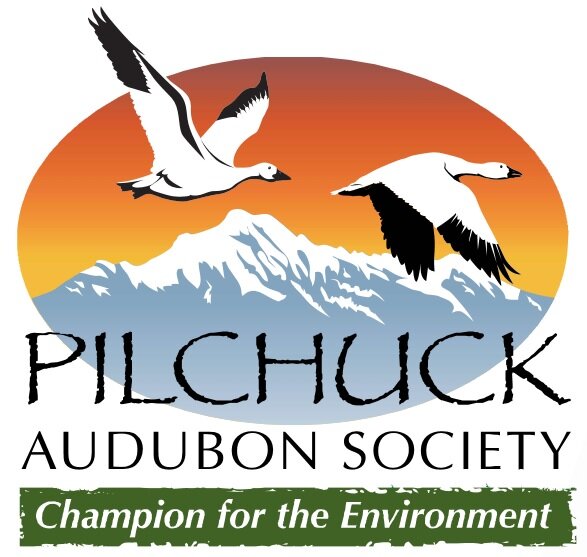Christmas Bird Count
Edmonds CBC: December 20, 2025
2024 Edmonds CBC Summary Report
Everett/Marysville CBC: TBD
What is the Christmas Bird Count?
The Audubon Christmas Bird Count (CBC) was started in 1900 as an alternative to the "Christmas side hunt" in which teams competed to shoot as many birds as possible, and it is the nation's longest running community science survey. From the original 25 CBC counts conducted on Christmas day in 1900, we are now up to over 2,600 CBC circles worldwide.
The 15-mile diameter count circles are divided into sections which are surveyed by teams of volunteers to identify and count all of the wild birds present. In addition to field teams, we have feeder watchers who identify and count the birds at their feeders. The results are tallied and submitted to the National Audubon Society. This long-term population data is used in multiple research projects like the State of the Birds and the Audubon's Birds and Climate Change Report.
Pilchuck Audubon Society has sponsored the Everett/Marysville CBC since 1974, and the Edmonds CBC since 1984.
We are proud to be ranked in the top 25 in participation for both the Edmonds CBC and the Everett/Marysville CBC out of over 2,600 CBC circles worldwide!
How to Participate
You can participate in one of three ways:
Join a field team: Field teams gather about dawn and generally bird until late in the afternoon. Some teams start in the pre-dawn hours or go out in the evening to listen for owls. Birders of all experience levels are welcome. Families with young children are better suited for the feeder watch portion of the CBC. Experienced birders are needed and we will try to place less experienced birders on experienced teams.
Be a feeder/yard counter: If you prefer to bird from your favorite chair with a cup of hot coffee or tea, do we have a deal for you! If your home falls within one of the two count circles, you can help by recording and reporting the birds at your feeders or in your yard. This is a lot of fun if you have young children or grandchildren who want to help. Please contact one of our compilers if you’d like to participate from the warmth of your home.
Be an organizer: If you’re more into the data crunching, volunteer recruiting, or outreach side of things, then we’d love to have you help our circle compilers! Our compilers take on huge roles and are always in need of help to make our counts go smoothly.
To get involved, contact one of our compilers, listed below.
Edmonds/South County CBC Circle
Area included: Edmonds, Mukilteo, Lynnwood, southern Everett, Mountlake Terrace, Bothell, Mill Creek, Lake Forest Park, Kenmore, and Maltby.
Compiler: Brian Zinke (cbc.waed@pilchuckaudubon.org, 425-232-6811)
Everett/Marysville CBC Circle
Area included: Marysville, northern Everett, Tulalip Reservation, Smokey Point, Hat Island, southern tip of Camano Island, and portions of Arlington and Lake Stevens.
Compiler: Scott Atkinson (cbc.waev@pilchuckaudubon.org, 425-210-2716)
Frequently Asked Questions
-
The Edmonds/South County CBC will be Saturday, December 14, 2024.
The Everett/Marysville CBC will be Saturday, December 28, 2024.
-
Then we especially encourage you to join us! It’s okay to feel unsure of your abilities when first getting into birding - we’ve all been there. The CBC is a great way to get into birding because, if you participate on a field team, you’ll be with a group of birders of all skill levels who are eager to help you learn. We all love birds, and we love sharing our passion and knowledge with newcomers.
Not to mention, winter is a great time to get into birding because without leaves on the trees, it’s much easier to see the birds!
-
Gear/clothing: Please bring your binoculars and field guide. If you have a spotting scope we encourage you to bring that, as well. The CBC goes rain or shine, so it’s best to be prepared for a variety of weather conditions. Dress in layers with a waterproof outer layer, a warm hat, gloves, and warm socks. We recommend waterproof footwear if you have it. Some routes require knee high wellies, while other routes are done mostly from the car.
Food/drink: It is best to plan on being out all day and to bring enough food and water to keep you nourished and hydrated. Depending on your group and route, you might be near your vehicle all day or you might not, so we’d recommend bringing a bag or backpack to take some snacks with you just in case you’re away from the car for a while.
-
On the evening of the CBCs, we gather for a potluck to enjoy some warm food and share the preliminary results. Your area leader or compiler will provide the location and times for the potluck. Volunteers are needed to help with potluck set-up and clean-up. This is a fun way to meet other birders, hear how their birding went, and share tales from the day!
-
-
Participation in the CBC is free. However, donations are always appreciated to ensure that Pilchuck Audubon can continue to fund our community science projects and programs. If you’d like to make a donation to Pilchuck Audubon, you can do so here. If you’d like to support National Audubon’s administration and management of the Christmas Bird Count and its data, ensuring that researchers and the government have access to our valuable data, you can do so here.
-
You can learn more about the CBC on the National Audubon Society website, and you can see where all of the circles are on this interactive map.

